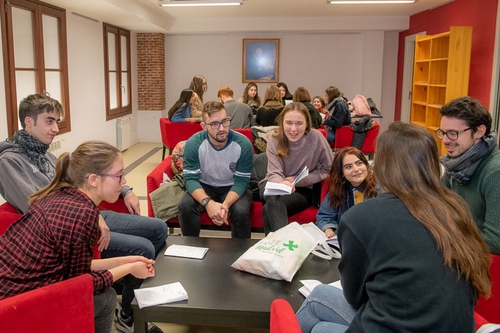Commented Bible Passages
February
Saint Paul wrote: When I preach the gospel, I cannot boast, since I am compelled to preach. Woe to me if I do not preach the gospel! If I preach voluntarily, I have a reward; if not voluntarily, I am simply discharging the trust committed to me. What then is my reward? Just this: that in preaching the gospel I may offer it free of charge, and so not misuse my rights as a preacher of the gospel.Though I am free and belong to no one, I have made myself a slave to everyone, to win as many as possible. To the Jews I became like a Jew, to win the Jews. To those under the law I became like one under the law (though I myself am not under the law), so as to win those under the law. To those not having the law I became like one not having the law (though I am not free from God’s law but am under Christ’s law), so as to win those not having the law. To the weak I became weak, to win the weak. I have become all things to all people so that by all possible means I might save some. I do all this for the sake of the gospel, that I may share in its blessings.Do you not know that in a race all the runners run, but only one gets the prize? Run in such a way as to get the prize. Everyone who competes in the games goes into strict training. They do it to get a crown that will not last; but we do it to get a crown that will last forever. Therefore I do not run like someone running aimlessly; I do not fight like a boxer beating the air. No, I strike a blow to my body and make it my slave so that after I have preached to others, I myself will not be disqualified for the prize. (1 Corinthians 9:16-27)
Saint Paul’s words are fire. His whole being is filled and animated by the zeal to announce the Gospel. For him it is a necessity, a happy obligation. Without being ashamed, he exclaims, “Woe to me if I do not preach the Gospel!” (v. 16). He speaks this way because the Gospel is God’s power for the salvation of those who believe (Romans 1:16). He was possessed by this power first of all, body and soul. When he encountered the Risen Christ, his life was changed and a new life of communion with Christ began. Now, he wants to communicate God’s love manifested in Jesus to those who do not know him yet.
With force and eloquence the apostle reveals the secret of his ministry of spreading the Gospel. Without contradicting or entering into polemics, he identifies with each person, even those who belong to opposite categories. He wants to go beyond cultural and religious divisions to reach all people, to “win” his hearers. The apostle is truly free and is not paralyzed by common opinions. His concern is to announce the Word of Life to all without exception, because Christ died and rose for all.
The images of the athlete and the crown show how much discipline, sacrifice and self-control are required for those who take part in the work of spreading the Gospel. Like athletes, Christ’s disciples need to train.
Paul is a realist. He knows that everyone will not accept his message. But that does not discourage him or keep him from daring to leap over apparently insurmountable barriers. Although he has worked hard and in a sense succeeded in his ministry, he does not succumb to pride. He is aware of his limits and his weakness. In spite of everything, God is at work. Paul will later say that we carry the treasure of the Gospel in vessels of clay (2 Corinthians 4:7). He is only too aware that the power comes from God, not us.
Paul demonstrates his zeal in announcing the Gospel not to brag but to encourage by his own example Christians dispersed among peoples who are mostly non-believers. He follows the example of Jesus, his master. During his life on earth Jesus himself did not exclude anyone and showed the face of a God who is the Father of all people.
Today, as in Saint Paul’s day, living out the Gospel and proclaiming it go hand in hand. In a world still characterized by divisions and oppositions, we are called to proclaim the Christ who destroyed the barrier of separation which is hatred, hostility (see Ephesians 2:14). Will we be bold enough to proclaim the Christ of communion instead of placing ourselves in one camp against another? This begins with ourselves. Saint Paul’s attitude inspires and challenges us.
![]() Who can I share my faith with? Where can I witness to it? If my hearer does not know Christ, what would my attitude be?
Who can I share my faith with? Where can I witness to it? If my hearer does not know Christ, what would my attitude be?
![]() What does Saint Paul mean by speaking about “offering the Gospel free of charge”? What does that mean for us today?
What does Saint Paul mean by speaking about “offering the Gospel free of charge”? What does that mean for us today?
![]() In my social and cultural environment, what barriers must I cross in order to proclaim the Gospel?
In my social and cultural environment, what barriers must I cross in order to proclaim the Gospel?
 TAIZÉ
TAIZÉ